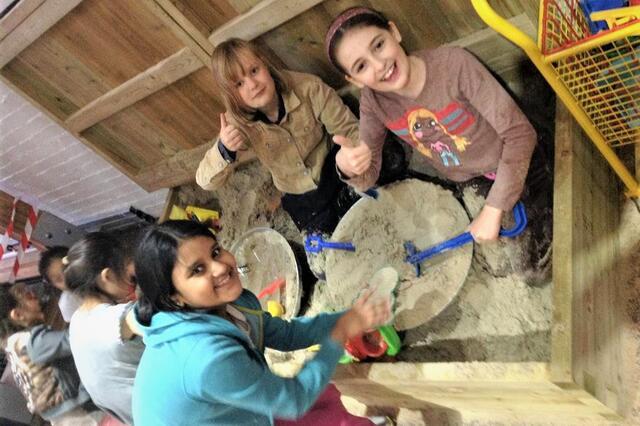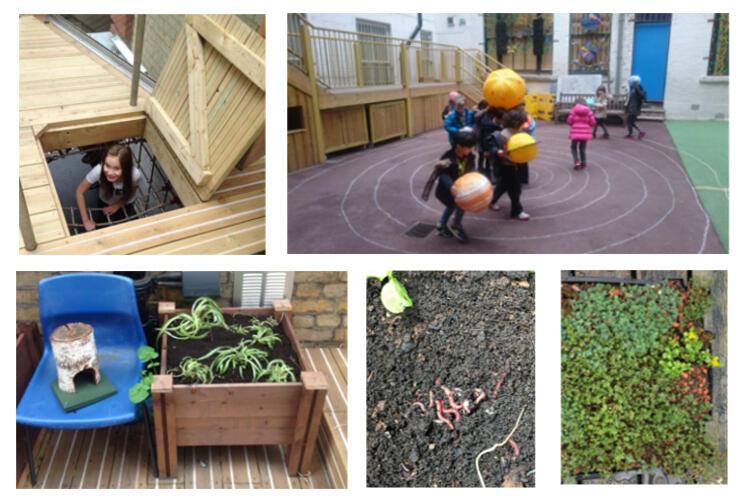Shaftesbury’s Wild West End Greening of Soho School
17 November 2017Shaftesbury’s Wild West End Greening of Soho School
17 November 2017As a key local partner for Soho Parish Primary School, Shaftesbury helped the school raise funds for a major playground redevelopment. The new multi-storey scheme has dramatically increased outdoor playable areas for schoolchildren in this central London location. Shaftesbury has also helped bring the space to life, introducing ecological enhancements such as sedum pods, bird boxes and insect habitats.
Key Facts
- 60% INCREASE IN PLAYGROUND SPACE
- SUPPORTING A VALUABLE SOCIAL ASSET NEAR SHAFTESBURY’S VILLAGES
- ENHANCING LOCAL CHILDREN’S WELLBEING THROUGH PLAY AND ACCESS TO NATURE
- ENCOURAGING BIODIVERSITY AS PART OF WILD WEST END
- DEMONSTRATING HOW COMMUNITY PARTNERSHIP CAN MAKE A POSITIVE DIFFERENCE
Situation
Shaftesbury is a listed Real Estate Investment Trust, which invests exclusively in London’s West End. Soho Parish Primary School is the only school in Soho. It is a small school with less than 24 pupils per class and very limited space.
Shaftesbury has a long-standing relationship with the school because it is a valuable social asset, near Shaftesbury’s villages. The school fulfils a vital role for the local community and contributes to the village atmosphere of Soho, which is part of what attracts businesses, residents and visitors to the area and to Shaftesbury’s assets.
In 2015, the Headteacher decided that, for the health and wellbeing of the children, the playground needed to be completely redeveloped. The small size of the existing playground limited the amount of time children had to explore, keep fit and play outside, with only two classes able to go outside to play at any time. Shaftesbury agreed to help the school raise money for the playground redevelopment.
In the same year, Shaftesbury became a founding member of Wild West End, a collaboration of West End property owners to create a network of green infrastructure for both environmental and community benefit. Shaftesbury identified an opportunity to introduce a range of greening initiatives in the new space that would contribute both to the children’s experience and to the biodiversity of the West End.
Actions
Funding and creating the playground
Shaftesbury was headline sponsor of the school’s main annual fundraising event, the Soho Food Feast, for the fifth year. This weekend long food festival is also supported by West End restaurants, including Shaftesbury’s occupiers. The remaining funds for the playground were raised with the help of Shaftesbury’s Chief Executive, Brian Bickell, who personally donated money and rallied other local property companies to donate. In addition, Shaftesbury organised and funded the official opening of the playground in 2015.
Features of the new playground include:
- Three storey timber structure that provides extra playtime space, including areas for quiet play and areas for outdoor teaching and learning.
- Vertical climbing areas and a cargo net suspended under the decking.
- A sandpit, Wendy house and built-in storage boxes that provide a great variety of play opportunities.
Greening the playground
Since the launch, Shaftesbury has introduced a series of greening initiatives and ecological enhancements, supported by sustainability consultants Arup and RPS Group.
Features which the Shaftesbury team helped build and install include:
- Ten sedum pod trays to form a 2m2 green roof, with a mix of species including spurium, ellacombianum, kamtschaticum, acre aureum, album, foresterianum, rupestre, sexsangulare and delosperma.
- Five raised beds, a cold frame filled with compost and gardening tool sets for a gardening club.
- A composting wormery that is being fed with waste from the school kitchen.
- Bird nesting boxes, a pollinating bee log and a ladybird and insect tower.
Financials
Over £200,000 fundraising to cover the playground redevelopment costs by the school’s partners, including Shaftesbury, which also played a key role in bringing other funders on board, e.g. funding breakfast events.
£800 Shaftesbury funding for ecological features.
Benefits
Soho Parish Primary School
- 60% more outdoor usable play space, from 110m2 to 180 m2. This has enabled the school to increase the school register by over 20 pupils. In turn, this has raised Government funding and, according to the Headteacher, saved the school from closure by reversing a decrease in revenue.
- Doubling the playground capacity from two to four classes, equating to around 55 additional children. This has enabled the school to amalgamate break times, add a second break in the afternoon and give the youngest children more time to use the outdoor space for their learning.
- Supporting children’s wellbeing by providing more opportunities for them to explore, keep fit and play outside. The school has also reported a positive impact on the children’s gross motor skills using the climbing areas.
- Enabling children in this urban area to enjoy nature as part of their daily lives, which studies show boosts wellbeing1. This also supports curriculum learning, with children now able to study insects and plants in situ, rather than at the nearest public park 20 minutes away. In addition, a regular gardening club has benefited 30 children so far.
- New opportunities created through the playground contributed to the school receiving an Outstanding rating in its latest Ofsted inspection.
Shaftesbury
- Enhancing Shaftesbury’s reputation with people living and working in this iconic area of London.
- Supporting Shaftesbury’s community goals, which align with the areas in which its villages are situated.
- Contributing to Shaftesbury’s Wild West End commitment to create green stepping-stones within a wider network of connected green spaces, encouraging birds, bees and bats back into the West End and offering opportunities for people to enjoy nature.
- Inspiring the Shaftesbury team and occupiers. Of all the company’s sustainability initiatives, those relating to biodiversity have appeared to generate the greatest interest and buy-in from both staff and occupiers.
Challenges and Achievements
LOGISTICS
How to deliver ecology projects in central London?
Central London locations produce challenges for biodiversity initiatives in terms of space and opportunity. However, even small-scale green features can bring big benefits, from encouraging city wildlife to enhancing people’s everyday experiences and inspiring employees. At Soho Parish Primary School and elsewhere across its portfolio (more here), Shaftesbury has fitted sedum pods. These are an important replacement for missing habitats in built-up areas. They are valuable habitats for bees, butterflies and other insects, linking to planters and roof gardens in adjacent buildings and so removing barriers to local biodiversity, helping it thrive.
MAINTENANCE
How to maintain ecology projects in central London?
Maintenance is a key consideration. The pods at Soho Parish Primary School include up to 12 species of sedum for optimal year-round performance, with a coarse substrate of recycled organic material acting as a growing medium. This means they only need one or two visits a year to check for plants that need replacing and to apply nutrients if required. Sedum is low maintenance and, although the pods may need a trim every few years, the cuttings can be left as they root again and thicken the matting. To monitor the impact of the pods, Shaftesbury is looking at including Soho Parish School in Wild West End biodiversity surveys.
PRACTICALITIES
How to deliver a project requiring infrastructure in a school environment?
Projects involving schools always need to work around the academic calendar. The major playground redevelopment could only be completed during the long school summer holidays. This put time pressure on the fundraising as, if the money was not raised in time for the 2015 holidays, it would delay the project by an entire year. To address this challenge, Shaftesbury’s Chief Executive became a major donor and promoter for the playground. Similarly, during the greening phase, everything needed to be scheduled out of school hours. Ecological features such as the sedum pods were delivered to the Shaftesbury offices during the day and then taken by the Shaftesbury team to the school and installed once children had left.
Find out more
Fiona Daly
Marketing & Community Engagement
Shaftesbury
1 Cox et al. (2017)
*Please note that the information on this page was supplied by the BBP Member and the BBP assumes no responsibility or liability for any errors or omissions in the content


